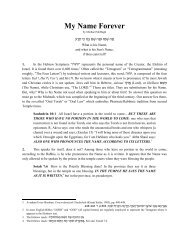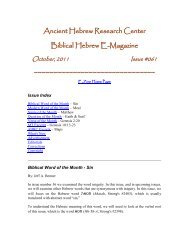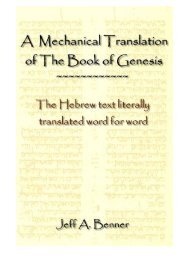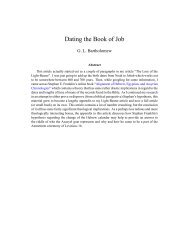Ancient Hebrew Language and Alphabet
Ancient Hebrew Language and Alphabet
Ancient Hebrew Language and Alphabet
You also want an ePaper? Increase the reach of your titles
YUMPU automatically turns print PDFs into web optimized ePapers that Google loves.
<strong>Ancient</strong> <strong>Hebrew</strong> <strong>Language</strong> <strong>and</strong> <strong>Alphabet</strong><br />
Passive vs. Active Nouns<br />
Greek nouns are words that refer to a person, place or<br />
thing. <strong>Hebrew</strong> nouns refer to the action of a person place<br />
or thing.<br />
The <strong>Hebrew</strong>s are active people <strong>and</strong> their vocabulary<br />
reflects this lifestyle. The Greek culture recognizes words<br />
such as knee <strong>and</strong> gift as nouns, which by themselves<br />
impart no action. But, in <strong>Hebrew</strong>, just as in most <strong>Ancient</strong><br />
languages 26 , there is no distinction between nouns <strong>and</strong><br />
verbs, all words are related to action. The Greek mind<br />
designates a knee <strong>and</strong> a gift as inanimate nouns unrelated<br />
in meaning. The <strong>Hebrew</strong> mind sees the knee ($rb / berak)<br />
as "the knee that bends" <strong>and</strong> a gift (hkrb / berakah) as<br />
"what is brought with a bent knee".<br />
Even the <strong>Hebrew</strong> nouns for father <strong>and</strong> mother are<br />
descriptive of action. The <strong>Hebrew</strong> word for father is ba /<br />
av <strong>and</strong> literally means "the one who gives strength to the<br />
family" <strong>and</strong> mother ~a / em means "the one that binds the<br />
family together".<br />
When we read the <strong>Ancient</strong> texts of the <strong>Hebrew</strong> Bible we<br />
must remember that the words used are related to the<br />
<strong>Ancient</strong> <strong>Hebrew</strong> culture <strong>and</strong> thought. We need, therefore,<br />
to suppress our Western Greek minds, leaving them for<br />
reading the Modern classics.<br />
26 Giorgio Fano, The Origins <strong>and</strong> Nature of <strong>Language</strong> (Indiana<br />
University Press, Bloomington, 1992) 66<br />
25






